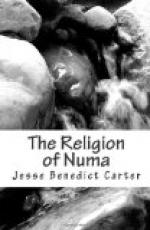So far it was good, and well had it been for Rome if she could have shut the gate of her Olympus now. What the old religion had not provided was now present. Politics, trade, and art were now represented. With these she was abundantly supplied for all her future career. But that was not to be, the gate was still open, and the destructive influence of Greece was soon to send in a host of new deities, who were destined not only to overwhelm the old Roman gods—which in itself we might forgive—but to sap away the old Roman virtues, to the maintenance of which the atmosphere of these old gods was essential. The forerunner of this influence was in himself innocent enough, it was Apollo, and it is to his coming and the subsequent developments which set him in distinct opposition to Juppiter Optimus Maximus that we now turn.
THE COMING OF THE SIBYL
The Rome of the first consuls was a very different Rome from that of the earlier kings. Not only was the population larger but it was divided socially into different classes. The simple patriarchal one-class community had been transformed into the complex structure of a society which had in it virtually all those elements and interests, except the more strictly intellectual ones, which go to make up what we call society in the modern sense. The world of the gods also had increased in population, and there too there was present a slight social distinction between the old gods (Indigetes) and the new-comers (Novensides), though it is open to question how strongly this distinction was felt. The new gods thus far were not incommensurable with the old




